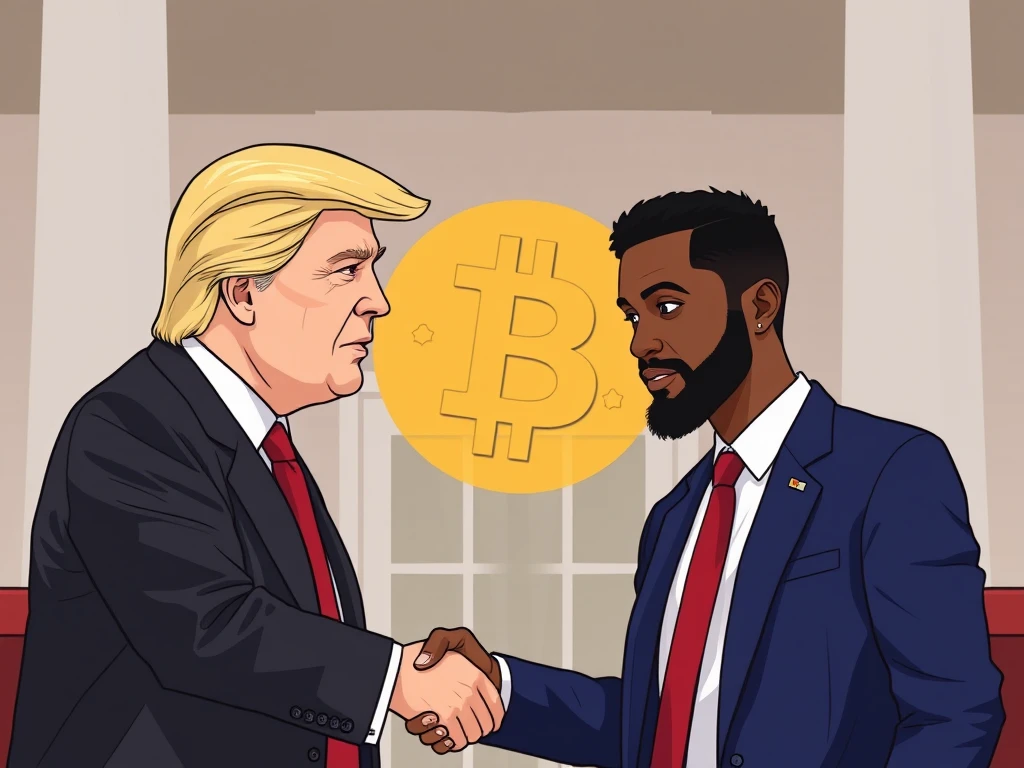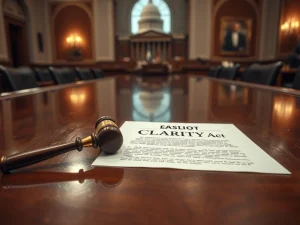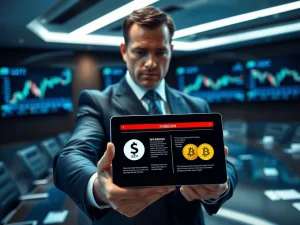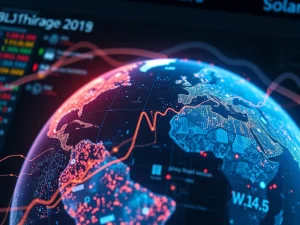Shocking White House Meeting: Bitcoin Ignored as Trump and Bukele Focus on Trade

In a surprising turn of events at the White House, Bitcoin, the flagship cryptocurrency championed by both former US President Donald Trump and El Salvador’s President Nayib Bukele, was conspicuously absent from their recent discussions. Despite both leaders heading administrations known for their pro-Bitcoin stances, their April 14th meeting centered squarely on trade and immigration, leaving the digital asset revolution on the sidelines. Was this a deliberate snub, or simply a matter of pressing priorities? Let’s delve into what transpired and why Bitcoin took a back seat.
Why Was Bitcoin Expected to be on the Agenda?
Given the public positions of both Trump and Bukele on cryptocurrency, the omission of Bitcoin from their official meeting agenda raises eyebrows. Consider these points:
- Bukele’s Bitcoin Revolution: El Salvador, under Bukele’s leadership, made history by adopting Bitcoin as legal tender in 2021. This bold move positioned El Salvador as a pioneer in the crypto space and garnered significant international attention.
- Trump’s Pro-Crypto Stance: In the lead-up to the 2024 elections, Trump has increasingly presented himself as a pro-crypto candidate. His administration even initiated steps towards creating a national Bitcoin strategic reserve, signaling a potential embrace of digital assets at the federal level.
- Shared Bitcoin Advocacy: With both leaders at the helm of pro-Bitcoin administrations, a discussion about digital assets seemed almost inevitable, particularly given the global interest in crypto regulation and adoption.
Despite this shared interest and the global narrative around cryptocurrency, the meeting’s focus remained firmly rooted in more traditional geopolitical and economic matters.
Trade and Immigration Take Center Stage: What Did Trump and Bukele Discuss?
According to official reports and livestreams from Bukele’s office, the meeting between Trump and Bukele prioritized discussions on trade and immigration. These topics, while crucial for bilateral relations, overshadowed any potential crypto conversations. Here’s a breakdown of the key discussion points:
Immigration and Security Cooperation
- Deportation of US Criminals: President Trump raised the possibility of transferring US citizens convicted of crimes back to El Salvador. He urged Bukele to expand El Salvador’s prison infrastructure to accommodate these individuals, highlighting ongoing efforts to deport foreign criminals.
- Bilateral Security: The meeting underscored the importance of security cooperation between the US and El Salvador, a consistent theme in their diplomatic relations, especially concerning migration control and transnational crime.
Trade and Economic Relations
- Automotive Industry Relief: Trump hinted at potential temporary exemptions for automakers amidst ongoing trade tensions. This suggests a focus on easing supply chain disruptions and supporting the US auto industry, indicating a priority on traditional economic sectors over emerging digital economies during this particular meeting.
- Trade War Considerations: The discussions touched upon the broader trade landscape, including the trade war initiated by the Trump administration, and how adjustments might be made to support specific industries like automotive manufacturing.
The agenda, therefore, was heavily weighted towards conventional diplomatic and economic issues, pushing Bitcoin and digital assets off the table, at least publicly.
El Salvador’s Bitcoin Strategy and IMF Pressures
While Bitcoin wasn’t a direct topic of conversation between Trump and Bukele during this White House visit, it’s crucial to remember the backdrop of El Salvador’s ongoing Bitcoin initiatives and the international pressures it faces. El Salvador’s pioneering adoption of Bitcoin as legal tender has been met with both enthusiasm and skepticism globally, particularly from international financial institutions like the IMF.
IMF’s Stance on Bitcoin in El Salvador
- Loan Agreement Conditions: El Salvador’s $1.4 billion loan agreement with the IMF included stipulations to scale back Bitcoin-related projects and reduce public sector involvement in digital assets. This reflects the IMF’s concerns about the financial stability and risks associated with cryptocurrency adoption at a national level.
- Legislative Adjustments: In response to IMF pressures, the Salvadoran Congress amended its Bitcoin laws in January, signaling a degree of compliance with the IMF’s recommendations. However, the government has continued its daily Bitcoin purchases, demonstrating a commitment to its digital asset strategy despite external pressures.
- Bitcoin Holdings: El Salvador’s National Bitcoin Office reports substantial holdings of Bitcoin, currently valued at over $520 million. This ongoing accumulation underscores Bukele’s administration’s persistent faith in Bitcoin as a strategic asset, even amidst financial scrutiny.
What Does Bitcoin’s Absence Mean?
The fact that Bitcoin was not publicly discussed during the Trump–Bukele meeting doesn’t necessarily indicate a shift in either leader’s stance on cryptocurrency. It may simply reflect the immediate priorities of bilateral relations at this moment. Several interpretations are possible:
- Focus on Immediate Concerns: Trade and immigration are undeniably pressing issues for both the US and El Salvador. Prioritizing these topics may simply reflect a pragmatic approach to address immediate challenges before delving into more nascent areas like digital asset policy on a bilateral level.
- Strategic Omission: Given the IMF’s scrutiny of El Salvador’s Bitcoin policy and potential regulatory uncertainties in the US, both leaders might have strategically avoided public discussions on Bitcoin to sidestep potential controversies or market volatility.
- Behind-the-Scenes Discussions: It’s also possible that Bitcoin and digital assets were discussed privately, away from the public agenda. Diplomatic meetings often involve multiple layers of conversation, and not all topics are publicly disclosed.
The Future of Bitcoin and Political Agendas
Regardless of its absence from this particular meeting’s agenda, Bitcoin remains a significant topic in both El Salvador and US political discourse. Bukele’s unwavering commitment to Bitcoin and Trump’s increasingly pro-crypto rhetoric suggest that digital assets will continue to play a role in their respective agendas.
As the global landscape of cryptocurrency evolves, and as nations grapple with the implications of digital finance, the intersection of Bitcoin, trade, and international relations will undoubtedly become more prominent. While Bitcoin might have taken a back seat in this White House meeting, it’s unlikely to remain there for long.
Conclusion: Bitcoin’s Quiet Moment in the Political Spotlight
The Trump–Bukele meeting served as a reminder that even for leaders known for their forward-thinking approaches to technology and finance, traditional geopolitical and economic issues often dominate the immediate agenda. While the crypto community might have anticipated Bitcoin to be a talking point, the focus on trade and immigration highlights the complex and multifaceted nature of international diplomacy. Bitcoin’s absence from the public discussion is noteworthy, but it doesn’t diminish its ongoing importance in the broader strategies of both El Salvador and the cryptocurrency landscape as a whole. The world watches on, waiting to see when and how Bitcoin will next take center stage in the global political arena.







